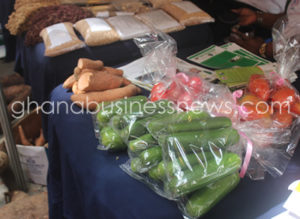World Bank financed projects yield results, improve livelihoods in Ghana
 The World Bank Group has over the years been a major partner in the developmental agenda of Ghana, financing projects virtually across all sectors.
The World Bank Group has over the years been a major partner in the developmental agenda of Ghana, financing projects virtually across all sectors.
The Bank has offered various forms of support either in loans or grants for sectors like education, agriculture, infrastructure and health among others all geared towards improving the lives of the populace, and more importantly, towards poverty reduction.
The Bank, recently organised the Country Portfolio Performance Review (CPPR), to assess the status of implementation of funded projects and also to develop strategies to enhance performance of its portfolio.
“This support from the World Bank has helped to develop a vaccine to prevent Newcastle diseases among poultry,” Daniel Tawiah, a veterinary officer of the Accra Veterinary Laboratory told ghanabusinessnews.com, in an exclusive interview.
According to Tawiah, the Newcastle Disease vaccine is given out for free to farmers in rural communities and the farmers are happy about the outcome.
“The vaccine has enabled them to increase their poultry size and yield,” he added.
The project, he said is under the West Africa Agriculture Productivity Project (WAAP), which according to Mr Augustine Oppong Danquah, the Monitoring and Evaluation Officer, is a two phase and a 10-year adaptable programme lending, dealing with technology generation, dissemination and adoption. The project is also focused on vegetables and cereals.
On education, the Bank’s support has enabled the construction of classrooms and other facilities for Senior High Schools (SHS), and an improvement in teaching methodologies under the Secondary Education Improvement project.
According to David Banamini, the Deputy Public Relations Officer (PRO), of the Ghana Education Service (GES), the Bank supported the government of Ghana in a form of a loan facility to the tune of $156 million to improve education in Senior High Schools.
He said the project which started in 2014 and will last for five years is subject to review.
“The previous government committed to build 200 community day schools and this project helped to build 23 out of it, which are at various stages of completion.” The Kwabenya and Adentan- Frafrah Community Day Schools are evidence to show the success of the project, he added.
Additionally, the project has also trained teachers in courses identified to be difficult and has also provided scholarships to students in deprived communities.
Another World Bank financed project called the Ghana Social Opportunities Project has taken poor people out of poverty in rural areas.
“The Bank’s support for the Livelihood Empowerment Against Poverty (LEAP), programme has led to the identification of the rightful poor people for appropriate cash transfers to support their lives,” Robert Austin, the National Coordinator of the Ghana Social Opportunities Project (GSOP),told ghanabusinessnews.com.
He indicated that even where a country’s economy is growing rigorously, a number of people will miss out in the prosperity and through this World Bank support such people have been provided the necessary skills to enable them work independently to be able to live decent lives while catering for their families. A World Bank loan of $138 million was secured for the project, he noted.
When asked about how effective the Bank’s support has impacted on their activities, he was quick to say, “the result is for you to see around here, the, results are obvious, he said pointing to photos and break down of implemented activities and photos of beneficiaries hanging under his exhibition shed.
By Pamela Ofori-Boateng
Copyright ©2017 by Creative Imaginations Publicity
All rights reserved. This news item or any portion thereof may not be reproduced or used in any manner whatsoever without the express written permission of the publisher except for the use of brief quotations in reviews.
